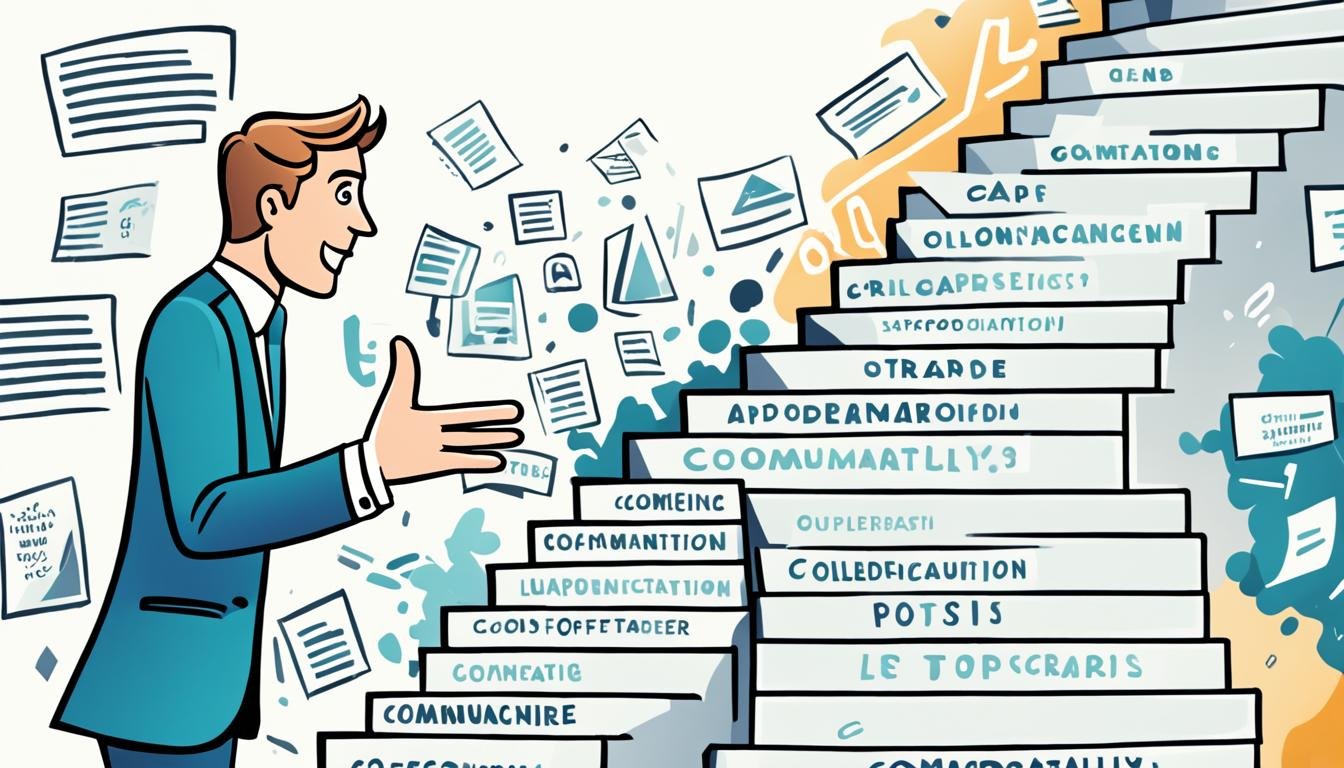Soft Skills Examples: Boost Your Career Today
“The single biggest problem in communication is the illusion that it has taken place.” – George Bernard Shaw
Communication is just one of the many soft skills that play a crucial role in our career success. While technical skills and knowledge are important, it is the ability to effectively communicate, collaborate, and adapt that truly sets individuals apart in the workplace. Soft skills are personal strengths that enable us to navigate challenges, lead teams, and grow in our roles.
In today’s fast-paced and interconnected world, the importance of soft skills cannot be overstated. Employers recognize that technical skills can be learned, but soft skills are often the determining factor in hiring decisions and promotions. Whether you’re a recent graduate looking to enter the workforce or a seasoned professional aiming to advance in your career, developing and showcasing your soft skills can give you a significant competitive edge.
In this article, we will explore the concept of soft skills, their importance, and provide you with a comprehensive list of examples to inspire your personal and professional growth. Discover how you can enhance your communication, problem-solving, and leadership abilities to boost your career and overcome workplace challenges. Let’s dive in!
Key Takeaways:
- Soft skills are personal strengths that are essential for success in any job.
- Employers prioritize soft skills when making hiring decisions and promotions.
- Developing and showcasing soft skills can give you a competitive edge in your career.
- Communication, problem-solving, and leadership are examples of important soft skills.
- Enhancing your soft skills can help you overcome workplace challenges and achieve career growth.
What are Soft Skills?
Soft skills are personal attributes, behaviors, and social attitudes that enable individuals to interact effectively with others in the workplace. Unlike hard skills, which are specific and measurable technical abilities, soft skills are intangible and subjective qualities that cannot be easily quantified. They are personal strengths that allow individuals to navigate professional challenges, collaborate with colleagues, and grow in their roles.
Soft skills encompass a wide range of abilities that are applicable across industries and job roles. These include:
- Communication: The ability to express ideas clearly and listen actively.
- Teamwork: The capacity to work collaboratively and contribute to a team’s success.
- Problem-solving: The skill of analyzing complex issues and finding effective solutions.
- Adaptability: The flexibility to adjust and thrive in rapidly changing environments.
- Time management: The ability to prioritize tasks and meet deadlines efficiently.
- Leadership: The capability to inspire and guide others towards common goals.
- Emotional intelligence: The aptitude to understand and manage emotions, both one’s own and others’.
These soft skills are essential for success in any job, as they contribute to effective collaboration, innovation, and personal growth. Employers highly value individuals with strong soft skills, recognizing their impact on workplace productivity and overall organizational success.
“Soft skills are the key to building strong relationships and fostering a positive work environment. They play a vital role in personal and professional growth, allowing individuals to excel in their roles and contribute to the success of their organizations.”
To illustrate the importance of soft skills, let’s take a closer look at the role of communication in the workplace:
Effective Communication: A Cornerstone Soft Skill
Effective communication is a fundamental soft skill that underpins successful collaboration, coordination, and understanding in the workplace. It involves conveying thoughts, ideas, and information clearly and concisely, as well as actively listening and responding to others.
Developing strong communication skills enables individuals to express themselves effectively, minimize misunderstandings, and build rapport with colleagues, clients, and stakeholders. It facilitates the exchange of information, increases productivity, and helps foster a positive work environment.
Moreover, effective communication plays a crucial role in leadership, conflict resolution, negotiation, and customer service, further highlighting its significance in professional success.
| Soft Skill | Definition | Importance |
|---|---|---|
| Communication | The ability to express ideas clearly and listen actively. | Enables effective collaboration, understanding, and relationship-building in the workplace. Enhances productivity and minimizes misunderstandings. |
| Teamwork | The capacity to work collaboratively and contribute to a team’s success. | Fosters a collaborative work environment, accelerates project completion, and promotes innovation through diverse perspectives. |
| Problem-solving | The skill of analyzing complex issues and finding effective solutions. | Facilitates efficient decision-making, critical thinking, and adaptability when faced with challenges or obstacles. |
By recognizing the importance of soft skills and continuously developing them, individuals can enhance their personal strengths and grow in their professional roles, while also contributing positively to their organizations.
Soft Skills vs. Hard Skills
In the professional world, the comparison between soft skills and hard skills is essential to understand the different dimensions of job performance. Hard skills encompass the technical abilities that individuals acquire through training or education.
On the other hand, soft skills refer to the social and interpersonal qualities that help individuals succeed on the job. These skills are not job-specific and are transferable across various roles and industries.
While hard skills are measurable and specific to a particular job, soft skills are intangible and subjective. Despite their distinct nature, both types of skills are equally important for a well-rounded and successful career.
“Hard skills are like the tools in a toolbox. They are necessary to get the job done, but without the soft skills, the toolbox cannot be effectively utilized.”
– Jane Stevens, HR Manager
Hard skills are necessary for job-specific tasks and technical abilities, such as coding, data analysis, or graphic design. These skills can be objectively assessed and are often listed as requirements in job postings.
On the other hand, soft skills are the foundation of effective communication, collaboration, problem-solving, and adaptability in the workplace. These skills include social and interpersonal qualities like communication, teamwork, empathy, adaptability, and leadership.
| Soft Skills | Hard Skills |
|---|---|
| Effective communication | Programming languages |
| Teamwork | Data analysis |
| Problem-solving | Project management |
| Adaptability | Graphic design |
| Leadership | Engineering |
In the modern workplace, soft skills are becoming increasingly important. Employers recognize that technical abilities alone do not guarantee success. Employees who possess strong soft skills can adapt to new challenges, collaborate effectively, and navigate complex situations with ease.
“While hard skills may get your foot in the door, it’s the soft skills that open new opportunities and keep you climbing the career ladder.”
– Mark Johnson, CEO
By developing both their technical abilities and social and interpersonal skills, individuals can excel in their roles and elevate their career prospects. Employers are actively seeking candidates who possess a balance of soft skills and hard skills in order to foster a positive and productive work environment.
44 Examples of Soft Skills
Soft skills play a vital role in workplace success, allowing individuals to effectively navigate challenges and collaborate with others. Here are 44 examples of soft skills that are essential for professional growth:
- Communication: The ability to convey information clearly and effectively to others.
- Writing: Strong written communication skills for various purposes, such as reports, emails, and presentations.
- Public speaking: The confidence and proficiency to deliver engaging speeches or presentations to a large audience.
- Responsiveness: Being prompt and attentive in addressing requests, messages, or inquiries.
- Empathy: The capacity to understand and share the feelings of others.
- Emotional intelligence: The ability to recognize, understand, and manage one’s own emotions and those of others.
- Listening: Actively paying attention to others and comprehending their perspectives.
- Cultural intelligence: The awareness and ability to work effectively in diverse cultural settings.
- Growth mindset: The belief that abilities and intelligence can be developed through dedication and hard work.
- Persistence: The determination and resilience to overcome obstacles and achieve goals.
- Results-oriented: Focusing on achieving desired outcomes and delivering high-quality work.
- Goal-setting: The ability to set clear objectives and create actionable plans to reach them.
- Time management: Efficiently organizing and prioritizing tasks to maximize productivity.
- Adaptability: The flexibility to adjust to new situations and embrace change.
- Creativity: Thinking outside the box to generate innovative ideas and solutions.
- Conflict resolution: The skill to identify, address, and resolve conflicts in a constructive manner.
- Leadership: Inspiring and guiding others towards a shared vision and goals.
- Teamwork: Collaborating effectively with colleagues to achieve common objectives.
- Problem-solving: The ability to analyze complex situations and find practical solutions.
- Critical thinking: Evaluating information and making reasoned judgments or decisions.
- Negotiation: Engaging in discussions to reach mutually beneficial agreements.
- Decision-making: Weighing options and selecting the most appropriate course of action.
- Networking: Establishing and maintaining professional connections and relationships.
- Coaching: Guiding and supporting others to enhance their skills and achieve their potential.
- Mentoring: Sharing knowledge, advice, and guidance with less experienced individuals.
- Collaboration: Working together with others to achieve shared goals and objectives.
- Innovation: Embracing and driving positive change through creativity and new ideas.
- Resilience: Bouncing back from setbacks and maintaining a positive attitude.
- Positivity: Maintaining an optimistic and enthusiastic outlook in the face of challenges.
- Customer service: Providing exceptional service and support to customers.
- Active listening: Giving full attention to others and comprehending their messages.
- Attention to detail: Thoroughly and accurately completing tasks with precision.
- Flexibility: The ability to adapt and adjust to changing circumstances and priorities.
- Professionalism: Conducting oneself with integrity, respect, and ethical behavior.
- Time management: Effectively utilizing time to prioritize tasks and meet deadlines.
- Integrity: Acting in an honest and ethical manner, upholding strong moral principles.
- Self-motivation: Initiative and drive to accomplish tasks without external prodding.
- Organization: Structuring and arranging tasks, information, and resources efficiently.
- Stress management: Effectively handling and coping with pressure and stressful situations.
- Patience: Demonstrating composure and tolerance when facing challenges or delays.
- Adaptability: Being open to change and able to adjust to new circumstances.
- Cultural competence: The ability to appreciate and work effectively with diverse cultures.
The Essential Soft Skills
The example of soft skills listed above represents a wide range of interpersonal and cognitive abilities that are highly valued in the workplace. From effective communication and problem-solving to leadership and teamwork, these skills empower individuals to excel in their careers and make a positive impact in their organizations. By developing and cultivating these soft skills, professionals can enhance their employability and thrive in any professional setting.
How to Improve Soft Skills
To succeed in the professional world, it is essential to continuously improve your soft skills. By enhancing your communication abilities, actively listening, and honing your problem-solving skills, you can become a more effective and valuable asset in any work environment.
Enhance Your Communication Abilities
Effective communication is key to building strong relationships and collaborating successfully with colleagues. To improve your communication skills:
- Adapt to Different Environments: Learn to adjust your communication style to fit different settings and effectively convey your message.
- Get to the Point Quickly: Practice conveying your thoughts concisely and directly, ensuring that your message is easily understood.
Practice Active Listening
Active listening is crucial for understanding others and fostering meaningful connections. To enhance your active listening skills:
- Give Undivided Attention: Show genuine interest in what the speaker is saying, maintain eye contact, and avoid distractions.
- Show Empathy: Try to understand the speaker’s perspective and emotions, demonstrating empathy and showing that you genuinely care.
Hone Your Problem-Solving Skills
Problem-solving skills are highly valued in the workplace. To enhance your problem-solving abilities:
- Analyze Issues Systematically: Break down problems into smaller components and analyze them step by step to identify effective solutions.
- Think Creatively: Embrace innovative thinking and seek alternative solutions to problems, approaching challenges from different angles.
Develop Emotional Intelligence and Empathy
Emotional intelligence and empathy are vital for building strong relationships and collaborating effectively with others. To develop these qualities:
- Recognize and Manage Emotions: Be aware of your own emotions and learn to manage them effectively, while also considering the emotions of others.
- Show Empathy and Understanding: Put yourself in others’ shoes, seek to understand their perspectives, and respond with empathy and compassion.
By actively working on these strategies, you can improve your soft skills and become a more effective communicator, listener, problem solver, and collaborator. Embracing continuous growth and development in your soft skills will ultimately contribute to your professional success and make you a valuable asset in any workplace.
How to Choose Soft Skills for Your Resume
When crafting your resume, it is crucial to carefully select the soft skills that best showcase your qualifications and relevance to the job requirements. By strategically incorporating relevant soft skills, you can impress potential employers and increase your chances of securing an interview. Here’s how to choose the right soft skills for your resume:
1. Research the Job Requirements
Start by thoroughly analyzing the job description and identifying the key soft skills that the employer is seeking. Look for specific keywords and phrases related to soft skills such as communication, teamwork, problem-solving, leadership, and adaptability. Highlight these skills as they will be essential in demonstrating your fit for the role.
2. Seek Industry Insights
Connect with professionals in your industry or reach out to individuals who are familiar with the role you are applying for. Engaging in conversation with them can provide valuable insights into the soft skills that are highly valued and sought after in your field. Their perspectives can help you narrow down the most relevant soft skills to emphasize on your resume.
3. Incorporate Soft Skills in Your Resume Sections
Strategically infuse your soft skills throughout your resume to effectively communicate your capabilities. Begin by integrating them into your resume objective or summary to immediately grab the attention of recruiters. Support your soft skills with specific examples in the experience section, showcasing how you have applied these skills in past roles. Additionally, consider dedicating a separate skills section to highlight your soft skills and provide additional evidence of your proficiency through certifications or awards.
4. Showcase Relevance through Examples
When describing your achievements and responsibilities in your past roles, include specific examples that demonstrate the application of your soft skills. Focus on accomplishments that showcase effective communication, team collaboration, problem-solving, leadership, and adaptability. By grounding your claims with real-life scenarios, you provide concrete evidence of your soft skill proficiency.
5. Strive for Balance
While it’s essential to highlight your relevant soft skills, ensure you maintain balance and avoid overwhelming your resume with an exhaustive list. Choose a mix of soft skills that align with the job requirements and reflect your strengths. Highlight those soft skills that differentiate you from other candidates and showcase your ability to contribute to the company’s success.
Resume Soft Skills Selection Table
| Soft Skills | Description |
|---|---|
| Communication | Effectively conveying ideas, actively listening, and fostering clear understanding |
| Teamwork | Collaborating with others, valuing diversity, and achieving shared goals |
| Problem-solving | Analyzing issues, evaluating options, and implementing effective solutions |
| Leadership | Inspiring and guiding others, taking charge, and driving results |
| Adaptability | Embracing change, adjusting to new circumstances, and thriving in evolving environments |
By following these steps, you can confidently select the most relevant soft skills and present yourself as a qualified candidate for the job. Remember to back up your claims with specific examples to showcase your soft skill proficiency and increase your chances of landing your desired role.
How to Assess Soft Skills in Candidates and Employees
To ensure a successful hiring process and effective employee evaluation, it is important to assess soft skills in candidates and employees. Soft skills play a crucial role in determining an individual’s ability to collaborate, communicate, problem-solve, and adapt in the workplace. Here are some effective methods that recruiters and managers can use to assess soft skills:
Incorporate Behavioral Interview Questions
One way to assess soft skills is through behavioral interview questions. These questions require candidates to provide specific examples of how they have demonstrated certain soft skills in the past. By analyzing their responses, recruiters can gain insight into an individual’s communication, teamwork, problem-solving, and leadership abilities.
Utilize Assessments, Simulations, or Role-Playing Exercises
Assessments, simulations, and role-playing exercises provide practical ways to evaluate soft skills. These activities allow candidates and employees to showcase their ability to adapt, communicate, and collaborate in a simulated work environment. By observing their performance during these exercises, recruiters and managers can gauge their soft skills proficiency.
Perform Performance Reviews and Feedback Sessions
Performance reviews and feedback sessions are valuable tools for assessing and developing soft skills in employees. Through these sessions, managers can provide constructive feedback on areas where employees can improve their soft skills. By offering guidance and support, managers can help employees enhance their communication, teamwork, problem-solving, and leadership abilities.
Assessing and nurturing soft skills in candidates and employees is crucial for building a cohesive and high-performing team. By utilizing behavioral interview questions, assessments, simulations, role-playing exercises, performance reviews, and feedback sessions, recruiters and managers can effectively evaluate soft skills and support ongoing skill development.
Soft Skills in Different Careers
Soft skills play a vital role in various careers across industries. These skills are not only essential for individual success but also contribute to the overall effectiveness of teams and organizations. Let’s explore how soft skills are crucial in different career paths:
1. Customer Service
In customer service roles, soft skills like communication, empathy, and problem-solving are key to delivering exceptional service to customers. Effective communication helps in understanding customer needs and addressing their concerns promptly and professionally. Empathy enables customer service representatives to connect with customers on an emotional level, showing understanding and providing support. Problem-solving skills aid in resolving customer issues efficiently, ensuring their satisfaction and loyalty.
2. Healthcare
In the healthcare industry, soft skills such as empathy, teamwork, and attention to detail are vital for providing quality care to patients. Empathy allows healthcare professionals to understand and connect with patients, providing them with the necessary emotional support. Teamwork ensures effective collaboration among healthcare teams, resulting in improved patient outcomes. Attention to detail is crucial for accurately assessing and addressing patient needs, minimizing the risk of errors and ensuring patient safety.
3. Digital Marketing
Soft skills play a significant role in the field of digital marketing. Creativity is essential for developing innovative marketing strategies and compelling content that captures the attention of target audiences. Adaptability allows digital marketers to navigate the rapidly evolving marketing landscape, embracing new technologies and trends. Teamwork enables effective collaboration with designers, copywriters, and web developers to deliver cohesive and successful digital marketing campaigns.
4. Management
In management positions, soft skills like leadership, communication, and problem-solving are critical for success. Effective leadership inspires and motivates teams, driving them towards achieving organizational goals. Communication skills enable managers to convey information clearly, delegate tasks efficiently, and foster strong working relationships. Problem-solving skills empower managers to address challenges, make informed decisions, and navigate complex situations.
5. Education
Soft skills are essential for educators in fostering a positive learning environment and facilitating student development. Strong communication skills are vital for conveying information effectively, engaging students, and addressing their individual needs. Patience is necessary when working with students of different abilities and learning styles. Critical thinking skills enable educators to develop innovative teaching methods and problem-solving approaches that enhance student learning.
6. Sales
In the sales profession, soft skills such as negotiation, persuasion, and empathy are crucial for building relationships and closing deals. Negotiation skills help sales professionals find mutually beneficial agreements that satisfy both the client and the company. Persuasion techniques are used to effectively communicate the value proposition and benefits of a product or service. Empathy allows sales professionals to understand customer needs and tailor their approach to provide personalized solutions.
Image depicting professionals in various careers utilizing different soft skills
| Career | Soft Skills |
|---|---|
| Customer Service | Communication Empathy Problem-solving |
| Healthcare | Empathy Teamwork Attention to detail |
| Digital Marketing | Creativity Adaptability Teamwork |
| Management | Leadership Communication Problem-solving |
| Education | Communication Patience Critical thinking |
| Sales | Negotiation Persuasion Empathy |
Soft skills play a significant role in the success of professionals across various careers. From customer service and healthcare to digital marketing, management, education, and sales, these skills are essential for effective performance and career advancement. Developing and honing soft skills can greatly contribute to professional growth and overall workplace effectiveness.
Conclusion
Soft skills play a vital role in career success and workplace effectiveness. These interpersonal attributes enable individuals to effectively communicate, collaborate, problem solve, and adapt to changing environments. Employers recognize the importance of soft skills and value them when hiring and evaluating employees.
By continuously improving their soft skills, individuals can enhance their career prospects and excel in their roles. Effective communication skills enable professionals to express their ideas clearly and build strong relationships with colleagues and clients. Collaboration skills foster teamwork and facilitate the accomplishment of shared goals. Problem-solving abilities equip individuals with the tools to tackle challenges and find innovative solutions.
Adaptability is a valuable soft skill that allows individuals to thrive in dynamic and evolving workplaces. Those who can quickly adapt to new technologies, market trends, and work processes are more likely to succeed in their careers. Consequently, investing time and effort into developing and honing soft skills can have a significant positive impact on an individual’s professional growth and overall workplace effectiveness.








